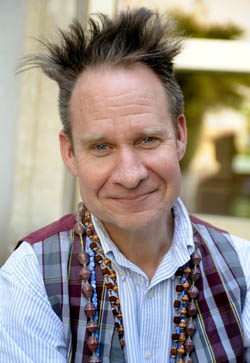Campus News
Acclaimed director Peter Sellars channels the power of art at Maitra Lecture
Peter Sellars, one of America’s leading directors, spoke of art’s transformative and community-building power at sold-out, 13th annual Maitra Lecture on campus.

Peter Sellars, one of America’s leading theater directors and an innovative figure in opera, mostly ignored the podium and steered clear of the stage during Friday night’s 13th annual Maitra Lecture at UC Santa Cruz.
Instead, Sellars, whose imaginative stagings of plays and operas often reflect on war, poverty, and the voices of people left behind by history, went out into the crowd, bounding up stairs at the UCSC Music Center Recital Hall, and inviting audience members to interrupt him at any time.
A few took him up on his offer, riffing on subjects ranging from the soullessness of Ikea furniture to the commoditization of art.
He introduced himself to the audience with the invocation, “hello, enlightened beings and mavens of culture!”
But Sellars touched down on serious subjects: the way art can bridge various disciplines, how art gives meaning to people’s lives, and the urgent need to hear suppressed voices, including those of prisoners.
“Art is way to change and liberate thought: behavioral patterns, habit energies, in any field,” he told the crowd at the event, which was sold out two weeks in advance. “Artists create something palpable, visceral, that you can engage in with the deepest part of the senses, with the deepest part of the self.”
Sellars, a professor of World Arts and Culture at UCLA, finds great cultural value in any art, “even the worst art, and there is a lot of it out there,” he said. “Ninety percent of art made at any given time is horrible, but you can’t blame art. Art is just a mirror of society. Even art I hate is actually testifying to something very powerful.”
Most of his presentation had a joyful, irreverent, and freewheeling quality. Even his appearance reflected these qualities, from his aerodynamic hairdo to his dark-blue button down shirt with paramecium-shaped blobs floating across it.
Decrying art that existed just for its own sake, Sellars spoke of art’s power to build, transform, and communicate, break down complex subjects, explore weighty moral issues, and create communities.
Sellars, who has been artistic director of the Los Angeles Festival, the American National Theater at the Kennedy Center, the Boston Shakespeare Company, and the Elitch Theater for Children in Denver, is known for his wildly imaginative presentations of opera. Long before the practice became trendy, Sellars was experimental with settings and time periods for operas and plays.
He once set Don Giovanni in an urban ghetto and the Marriage of Figaro in a corporate high-rise. As a Harvard student, he staged Antony and Cleopatra in the campus’s Adams House Pool, with a key scene unfolding on the diving board. Some of the audience members got splashed.
He said his main attraction to opera is the collaborative space built into this classic art form. “The important question is how do we share that space?” he said. “How do we identify, protect, and sacralize shared space?”
The Maitra Lecture Series was established by Anuradha Luther Maitra in memory of her husband, Sid, a scientist, entrepreneur, and admirer of the work of late Indian film director Satyajit Ray.
The lecture is sponsored by the UC Santa Cruz Foundation, and is one of the cornerstone events of UCSC’s annual Founders Celebration. The inaugural speaker, 13 years ago, was the award-winning author and novelist Vikram Seth. In 2011, the doctor and bestselling author Abraham Verghese gave a talk about the need to preserve human intimacy in the increasingly tech-driven medical industry.
Sometimes, Sellars’ talk took on a somber tone, especially when he spoke about prisoners whose voices and powers of expression had been taken away from them. He also cited one brilliant exception to this sad rule: Boethius, a sixth-century Roman philosopher. He was murdered after a long imprisonment, but one of his masterpieces, Consolation of Philosophy, written during his long incarceration, remains in print to this day.
But he put a strong emphasis on “art as a safe zone where all other departments interact.” He said young arts graduates are “the highest employed … because they are trained in creative problem solving, trained to look at things differently. And they are trained to have a good time, not just associate bad feeling with everything.”
He added that people do their best thinking “in a state of pleasure, not in a state of puritanical self-hatred.”